The SSD Relapse: Understanding and Choosing the Best SSD
by Anand Lal Shimpi on August 30, 2009 12:00 AM EST- Posted in
- Storage
What's Wrong with Samsung?
The largest SSD maker in the world is Samsung. Samsung makes the drives offered by Apple in its entire MacBook/MacBook Pro lineup. Samsung makes the drives you get if you order a Lenovo X300. In fact, if you're buying any major OEM system with an SSD in it, Samsung makes that drive.
It's just too bad that those drives aren’t very good.
This is the 4KB random write performance of Samsung's latest SSD, based on the RBB controller:
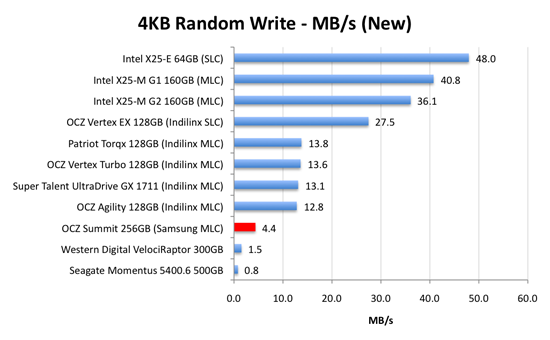
4.4MB/s. That's 3x the speed of a VelociRaptor, but 1/3 the speed of a cheaper Indilinx drive.
Speedy, but not earth shattering. Now let's look at performance once every LBA has been written to. This is the worst case scenario performance we've been testing for the past year:
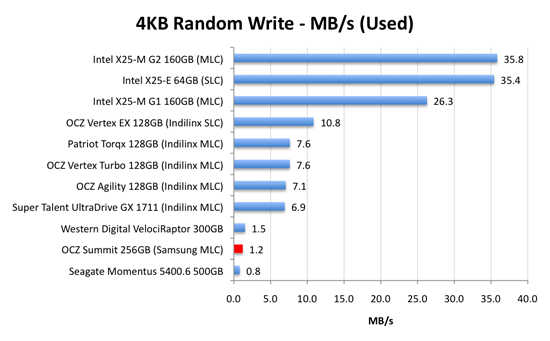
...and now we're down to mechanical hard drive speeds
Holycrapwtfbbq? Terrible.
Now to be fair to Samsung, this isn’t JMicron-terrible performance. It’s just not worth the money performance.
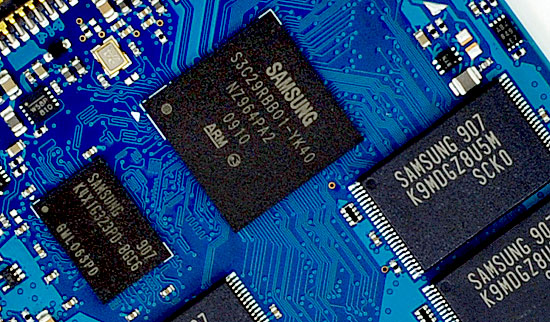
The Samsung RBB based SSDs are rebranded by at least two manufacturers: OCZ and Corsair.
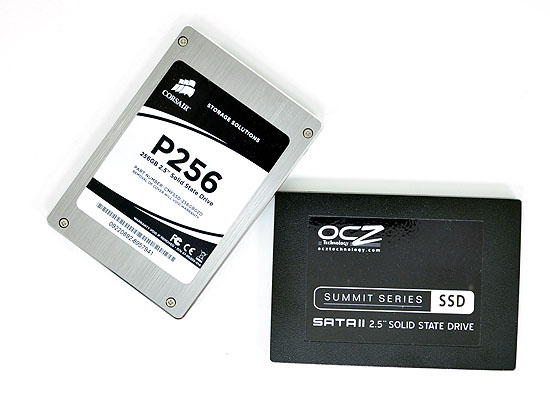
The OCZ Summit and the Corsair P256 both use the Samsung RBB platform.
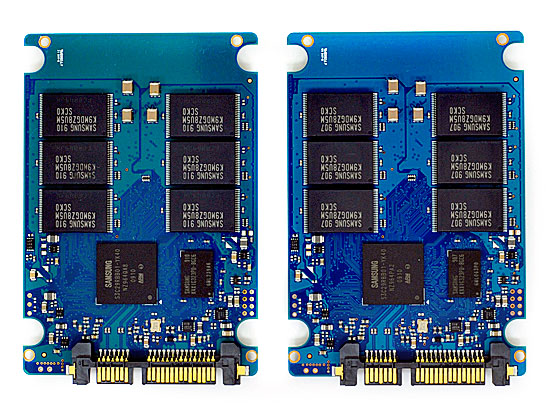
The Corsair and OCZ Samsung RBB drives.
The drive most OEMs are now shipping is an even older, lower performing Samsung SSD based on an older controller.
I talked to some of the vendors who ship Samsung RBB based SSDs and got some sales data. They simply can’t give these drives away. The Indilinx based drives outsell those based on the Samsung RBB controller by over 40:1. If end users are smart enough to choose Indilinx and Intel, why aren't companies like Apple and Lenovo?
Don't ever opt for the SSD upgrade from any of these OEMs if you've got the option of buying your own Indilinx or Intel drive and swapping it in there. If you don't know how, post in our forums; someone will help you out.
Samsung realized it had an issue with its used-state performance and was actually the first to introduce background garbage collection; official TRIM support will be coming later. Great right? Not exactly.
There’s currently no way for an end user to flash the firmware on any of these Samsung drives. To make matters worse, there’s no way for companies like OCZ or Corsair to upgrade the firmware on these drives either. If you want a new firmware on the drive, it has to go back to Samsung. I can’t even begin to point out how ridiculous this is.
If you’re lucky enough to get one of the Samsung drives with background garbage collection, then the performance drop I talked about above doesn’t really matter. How can you tell? Open up Device Manager, go to your SSD properties, then details, then select Hardware Ids from the dropdown. Your firmware version will be listed at the end of your hardware id string:
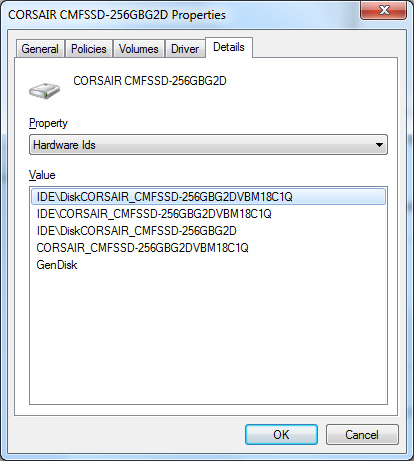
Version 1801Q doesn’t support BGC. Version 18C1Q (or later) does.
How can you ensure you get a model with the right firmware revision? Pick a religion and start praying, because that’s the best you can do.
Now the good news. When brand new, the Samsung drives actually boast competitive sequential write, sequential read and random write speeds.
These drives are also highly compatible and very well tested. For all of the major OEMs to use them they have to be. It’s their random write performance that’s most disappointing. TRIM support is coming later this year and it will help keep the drives performing fresh, but even then they are still slower than the Indilinx alternatives.
There’s no wiper tool and there’s currently no method to deploy end-user flashable firmware updates. Even with TRIM coming down the road, the Samsung drives just don’t make sense.










295 Comments
View All Comments
sunbear - Monday, August 31, 2009 - link
Even though most laptops are now SATA-300 compatible, the majority are not able to actually exceed SATA-150 transfer speeds according to some people who have tried. I would imagine that sequential read/write performance would be important for swap but the SATA-150 will be the limiting factor for any of the SSD's mentioned in Anand's article in this case.Here's the situation with Thinkpads:
http://blogs.technet.com/keithcombs/archive/2008/1...">http://blogs.technet.com/keithcombs/arc...vo-think...
The new MacBookPro is also limited to SATA-150.
smartins - Tuesday, September 1, 2009 - link
Actually, The ThinkPad T500/T400/W500 are fully SATA-300 compatible, it's only the drives that ship with the machines that are SATA-150 capped.I have a Corsair P64 on my T500 and get an average of 180MB/read which is consistent with all the reviews of this drive.
mczak - Monday, August 31, 2009 - link
article says you shouldn't expect it soon, but I don't think so. Several dealers already list it, though not exactly in stock (http://ht4u.net/preisvergleich/a444071.html)">http://ht4u.net/preisvergleich/a444071.html). Price tag, to say it nicely, is a bit steep though.Seramics - Monday, August 31, 2009 - link
Another great articles from Anandtech. Kudos guys at AT, ur my no. 1 hardware site! Anyway, its really great that we have a really viable competitor to Intel- Indilinx. They really deserve the praise. Now we can buy a non Intel SSD and have no nonsensical stuttering issue! Overall, Intel is still leader but its completely nonsensical how bad their sequential write speed is! I mean, its even slower than a mechanical hard disk! Thats juz not acceptable given the gap in performance is so large and Intel SSD's actually can suffer a significantly worst performance in real world when sequential write speed performance matters. Intel, fix your seq write speed nonsence please!Seramics - Monday, August 31, 2009 - link
Sorry for double post. Its unintentional and i duno how to delete the 2nd post.Seramics - Monday, August 31, 2009 - link
Another great articles from Anandtech. Kudos guys at AT, ur my no. 1 hardware site! Anyway, its really great that we have a really viable competitor to Intel- Indilinx. They really deserve the praise. Now we can buy a non Intel SSD and have no nonsensical stuttering issue! Overall, Intel is still leader but its completely nonsensical how bad their sequential write speed is! I mean, its even slower than a mechanical hard disk! Thats juz not acceptable given the gap in performance is so large and Intel SSD's actually can suffer a significantly worst performance in real world when sequential write speed performance matters. Intel, fix your seq write speed nonsence please!Shadowmaster625 - Monday, August 31, 2009 - link
Subtle. Very subtle. Good article though.3 questions:
1. Is there any way to read the individual page history off the SSD device so I can construct a WinDirStat style graphical representation of the remaining expected life of the flash? Or better yet is there already a program that does this?
2. Suppose I had a 2 gigabyte movie file on my 60gb vertex drive. And suppose I had 40GB of free space. If I were to make 20 copies of that movie file, then delete them all, would that be the same as running Wiper?
3. Any guesses as to which of these drives will perform best when we make the move to SATA-III?
4. (Bonus) What is stopping Intel from buying Indilinx (and pulling their plug)? (Or just pulling their plug without buying them...)
SRSpod - Thursday, September 3, 2009 - link
3. These drives will perform just as they do now when connected to a 6 GBps SATA controller. In order to communicate at the higher speed, both the drive and the controller need to support it. So you'll need new 6 GBps drives to connect to your 6 GBps controller before you'll see any benefit from the new interface.heulenwolf - Monday, August 31, 2009 - link
Yeah, once the technology matures a little more and drives become more commoditized, I'd like to see more features in terms of feedback on drive life, reliability, etc. When I got my refurb Samsung drives from Dell, for example, they could have been on the verge of dying or they could have been almost new. There's no telling. The controller could know exactly where the drive stands, however. Some kind of controller-tracked indication of drive life left would be a feature that might distinguish comparable drives from one another in a crowded marketplace.While they're at it, a tool to allow adjusting of values such as the amount of space not reported to the OS with output in terms of write amplification and predicted drive life would be really nifty.
Sure, its over the top, but we can always hope.
nemitech - Monday, August 31, 2009 - link
I picked up an Agility 120 Gb for $234 last week from ebay ($270 list price - - 6% bing cashback - $20 pay pal discount). I am sure there will be similar deals around black Friday. $2 per Gb is possible for a good SSD.